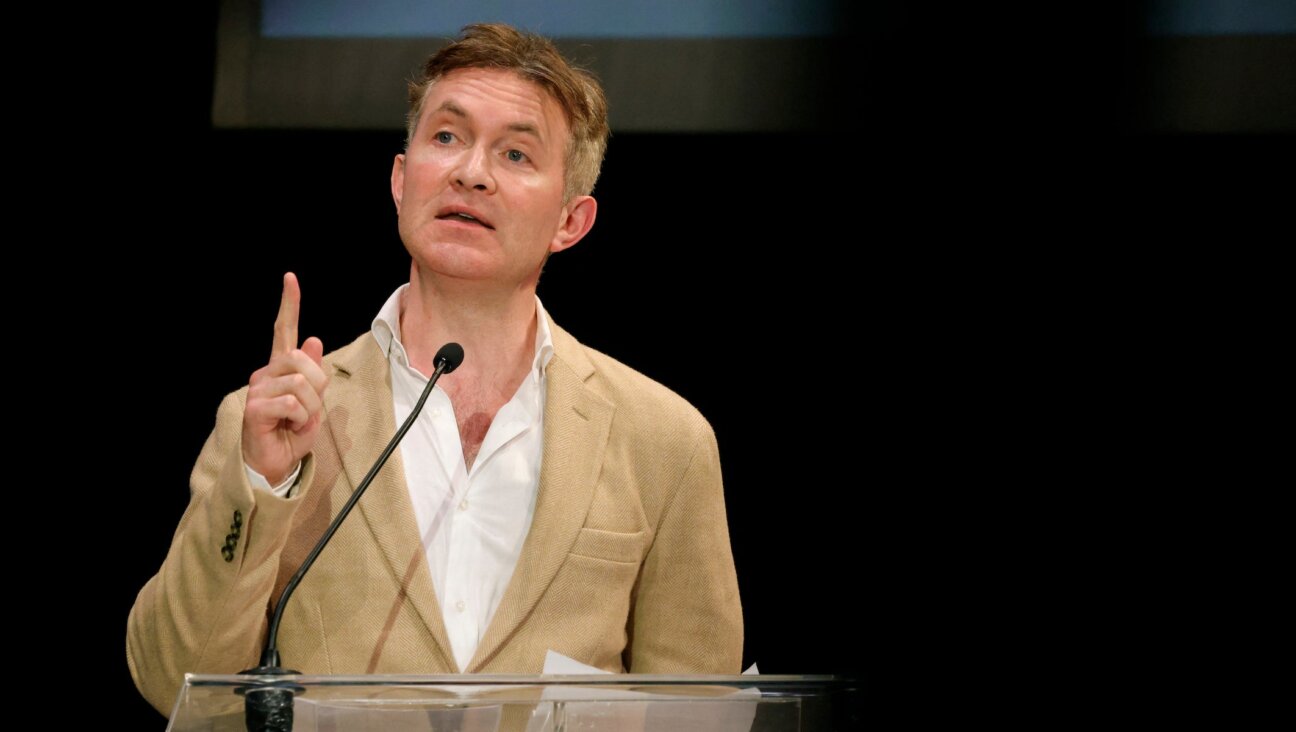Half-Jewish Ain’t the Whole Megillah for Her

Image by Lily Padula
The Seesaw is a new kind of advice column in which a broad range of columnists will address the real life issues faced by interfaith couples and families. Read the discussion and vote below for what you think is the best response to this particular quandary. You can email your own questions, which will remain anonymous, to: [email protected]
We Don’t Agree About How to Raise Our Unborn Child
We are an interfaith married couple expecting our first child. She was raised Jewish and wants to raise our daughter Jewish because she doesn’t believe in both. She would rather do only Jewish or Christian or nothing — though, of course, she strongly prefers Jewish both because it is hers and it is a beautiful tradition that is shrinking. He was raised Protestant and thinks there is no problem in raising a kid with both and allowing them to decide when they grow up. Seesaw, what do we do? (Besides love our child. We know that part.) —Baby on Board
We Did Both

SUSAN KATZ MILLER: I am an interfaith child raised with only Judaism. My husband and I raised our children with both family religions. So I have experience both in an interfaith family practicing one religion, and in a family educating children in both religions. And I can’t tell you what to do, because no single pathway is going to work for every interfaith family. Each route (one religion, both, none) has specific challenges and benefits. Figuring out the way your interfaith family should affiliate and practice together is a very intimate process.
Husband, you don’t mention how you feel about your own Protestant religion. You need to talk about how and why each of you wants to practice going forward, and how each of you would honestly feel raising a child in the other religion. This is not a process that should be driven by external pressures, or historical guilt.
Children benefit from a sense of community, and from more education rather than less. So I urge you to avoid doing “nothing.” If you are a more secular family, you might consider Humanistic Judaism, Unitarian-Universalism, or Ethical Culture. If you join a church and/or synagogue, make sure to choose one that will include both parents as equal partners. You need clergy who understand that on some level interfaith children will always feel connected to both parents, and religions, no matter what label you give them.
My children have only one Jewish grandparent, but I wanted to connect them to what you, the wife, rightly describes as a “beautiful tradition that is shrinking.” I wonder if you, the wife, would truly be happier raising Protestant children than giving them interfaith education. For our family, doing both included reading from the Torah when our children turned thirteen. Since you are considering doing both, I would humbly urge both of you to read my book. “Being Both: Embracing Two Religions in One Interfaith Family” documents how interfaith children raised with interfaith education feel deeply connected to Judaism (and Christianity). It may help you to make this important decision, whether you decide on one, or both, or secular humanism. Finally, remember that ultimately children decide for themselves when they grow up how to practice and affiliate, whether we raise them with one religion, or two, or none.
Susan Katz Miller is both an adult interfaith child, and an interfaith parent. She is a former Newsweek reporter, and the author of “Being Both: Embracing Two Religions in One Interfaith Family” (Beacon Press).
We Did One

JANE LARKIN: My husband and I were faced with the same challenge as you. Like you, the wife, I wanted a Jewish home. Like you, the husband, my husband wanted to do both.
To find a solution, we took a class taught by a priest and a rabbi. Both clergy strongly recommended that we chose one religious identity for our home and made us consider the decision from a child’s perspective.
The priest said, “Your child is asked to make one winter holiday art project. She must choose red and green paper for Christmas or blue and white paper for Hanukkah. This appears to be a simple choice. But for a child being raised in a home with two faiths, with no clear religious identity, this isn’t a choice between colored papers, it’s a choice between mommy and daddy. That’s a decision no child wants to make.”
The story made us consider how our decision would affect a child. We understood that children didn’t have the developmental toolkit to make a choice about religion, and by choosing one identity we’d be able to provide a framework for imparting the values that we wanted to instill. We realized that a single faith wouldn’t prevent our children from having full knowledge of their religious background. Rather, it would provide a basis from which to discuss the commonalities, differences, and intertwined history of Christianity and Judaism.
Ultimately, we chose to raise our son Jewish. But, we celebrate non-Jewish holidays with our extended family and engage in discussions about religion with all our relatives.
Raising your daughter in a single faith won’t stop her from enjoying all of your extended family’s traditions, or exploring and questioning faith later in life. Rather, a clear religious identity will give her a foundation from which to make educated decisions, and accept or reject religious ideas as she matures.
Jane Larkin is the author of “From Generation to Generation: A Story of Intermarriage and Jewish Continuity.” She writes about interfaith relationships and Jewish living for Interfaithfamily and other outlets. Follow her on Twitter @JaneLarkin6.
Go Deep, Not Broad

SCOTT PERLO:
Wife, I have sympathy for your point that all spiritual traditions are beautiful, but that Judaism is rarer. I’d also point out that your daughter will be Jewish according to Jewish law. But I understand that that’s the kind of thing a rabbi would say, and that the two of you are trying to figure out what fits your family best.
So rather than give an answer, I’d push you to change your question. I think that raising children in faith traditions isn’t a matter of what they can choose when they grow up, but rather what they will learn while they’re young.
Her religious choices will be her own, no matter what. Really. By the time she’s sixteen (please God), you will have found that you have surprisingly little influence as to just about everything she does, let alone her religious practice. Historically, people weren’t always free to choose their spiritual paths; however, we live in a society where people can decide to be whatever they want to be, and often do just that.
But there’s a kind of learning she can only get when she’s young, and her brain is a little sponge. I love to learn new things as an adult, but often have trouble remembering what I had for breakfast. I find that this plays out with my adult students, who often struggle for years (if not the rest of their lives) just to pronounce the Hebrew, let alone to learn the spiritual techniques that connect their heart, mind and soul together – and to the Holy One.
So my advice is that whatever you choose, go deep rather than broad. Let her learn to give of herself; let her learn the power of community and the gifts of interconnection; let her learn to pray and to connect her heart to God; let her learn how to be strong from the inside out. Her choices will be all the more rich for the investment.
Rabbi Scott Perlo is a rabbi at Sixth & I Historic Synagogue in Washington D.C, a unique institution that reaches out to Jewish and “Jewish adjacent” young professionals of all denominations and backgrounds.
















